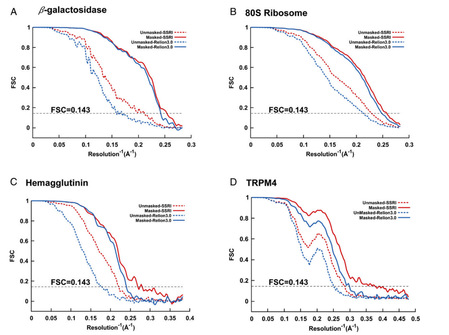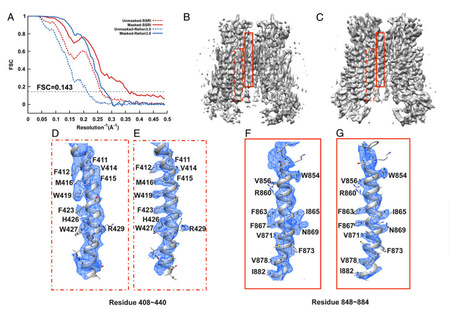Cryo-electron microscopy (Cryo-EM) single-particle analysis is a powerful method for determining macromolecular structures. Three-dimensional refinement is a critical component of cryo EM single-particle reconstruction. Recently Dr Jianpeng Ma and his collaborators report the development of a computational method, OPUS-SSRI, and its application to seven real cryo-EM datasets. Our data clearly demonstrated that OPUS-SSRI can improve the final resolutions and structural details in cryo-EM single-particle analysis.
In this work, researchers present a refinement method for cryo-electron microscopy (cryo-EM) single-particle reconstruction, termed as OPUS-SSRI (Sparseness and Smoothness Regularized Imaging). In OPUS-SSRI, spatially varying sparseness and smoothness priors are incorporated to improve the regularity of electron density map, and a type of real space penalty function is designed.

Moreover, the work define the back-projection step as a local kernel regression and propose a first-order method to solve the resulting optimization problem. On the seven cryo-EM datasets that we tested, the av erage improvement in resolution by OPUS-SSRI over that from RELION 3.0, the commonly used image-processing software for single-particle cryo-EM, was 0.64 Å, with the largest improvement being 1.25 Å.

The work was published in Proceedings of the National Academy of Sciences at Sparseness and Smoothness Regularized Imaging for improving the resolution of Cryo-EM single-particle reconstruction | PNAS and the implementation of OPUS-SSRI can be found at https://github.com/alncat/cryoem.
About Professor Jianpeng Ma
Dr Ma is an Elected Fellow of the American Society for Medical Bioengineering, an Elected Fellow of the American Association for the Advancement of Science(AAAS), an Elected Fellow of the American Physical Society(APS), and a recipient of the 2004 Norman Hackermann Award for Chemical Research.
He joined Fudan University, China in 2018 after being Lodwick T. Bolin Professor in Biochemistry for Baylor College of Medicine and Rice University. Together with Professor Michael Levitt, he founded The Multiscale Research Institute for Complex Systems(MRICS) at Fudan University and served as its Dean.
Dr Ma’s research interests include biophysics, computational biology, and structural biology. He is dedicated to the development of new computational methods for the study of biological systems that can be used to overcome the difficulties in experimental research and to solve important problems in complex biological systems in combination with experimental methods.
About SIAS
Shanghai Institute for Advanced Study of Zhejiang University (SIAS) is a jointly launched new institution of research and development by Shanghai Municipal Government and Zhejiang University in June, 2020. The platform represents an intersection of technology and economic development, serving as a market leading trail blazer to cultivate a novel community for innovation amongst enterprises.
SIAS is seeking top talents working on the frontiers of computational sciences who can envision and actualize a research program that will bring out new solutions to areas include, but not limited to, Artificial Intelligence, Computational Biology, Computational Engineering and Fintech.

